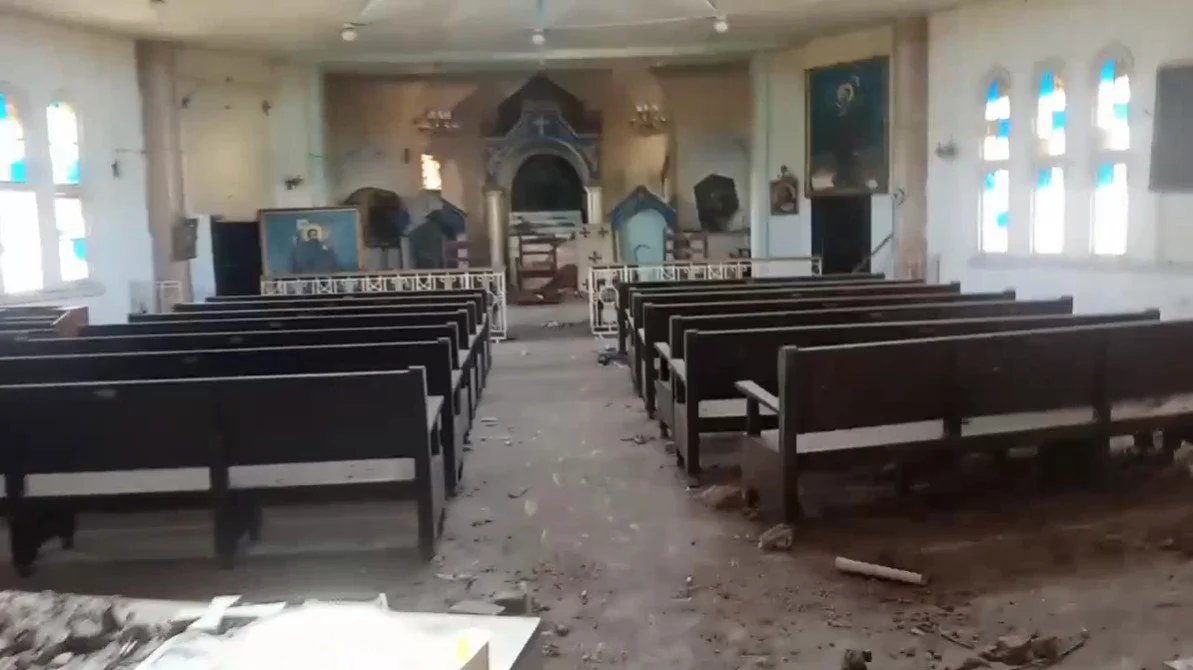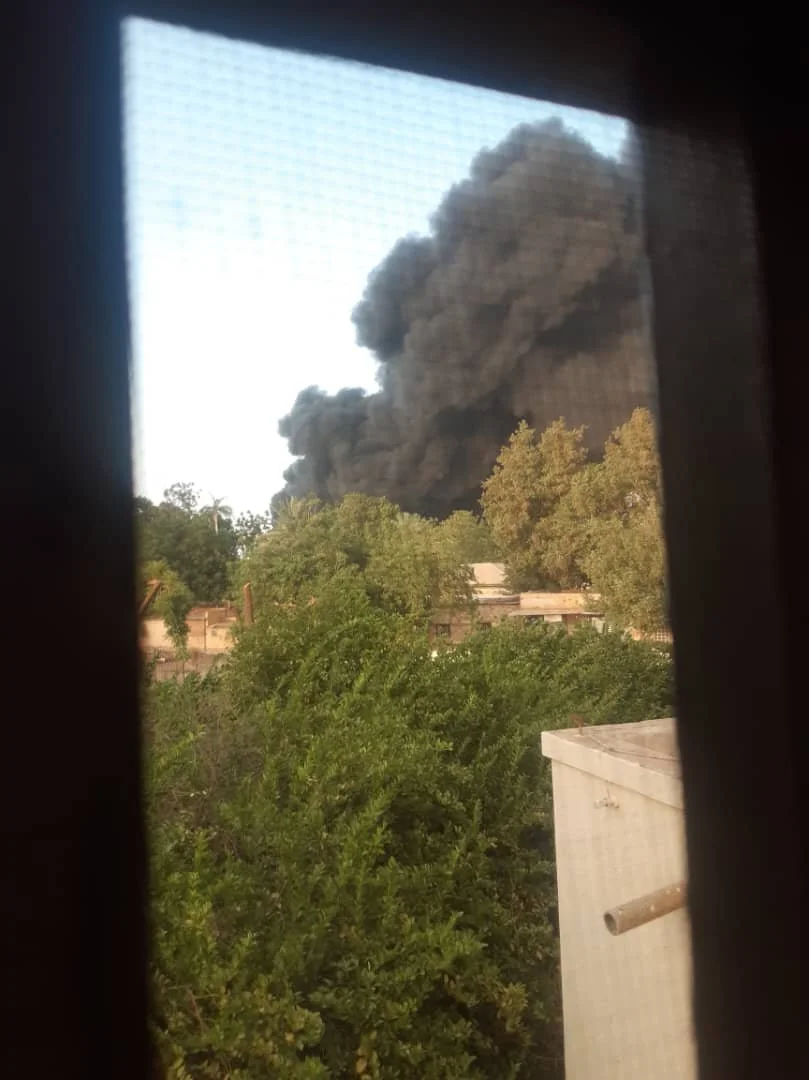Reflecting on two years of war
On April 15 2023 war broke out in Sudan between the Sudanese Armed Forces (SAF) and Rapid Support Forces (RSF) displacing over 12 million and claiming over 150,000 lives. During those days I remember speaking to Sudanese-Armenian family and friends who were devastated at the destruction and attempting to help loved ones. The Armenian community was also impacted, Zvart and Arpi Yegavian tragically died in their homes in Khartoum, and the rest of the community has been displaced. It was during these days that this project was conceived to document the heritage of the community and contribute to efforts to preserve Sudanese cultural heritage.
Despite Khartoum recently being taken by the army, two years on the war continues to have devastating impacts. Through the project I have spoken to Armenians who are currently displaced from their homes and I also recently had the opportunity to speak to Elina Danieljan, an Armenian humanitarian aid worker who has been working in Sudan for the past 18 months for an INGO supporting primary health facilities. You can watch our conversation here or read the transcript below.
This conversation between me and Elina is between two diasporan Armenians who aren’t from Sudan and are reflections on the war rather than updates or opinions. To hear updates and opinions about developments in Sudan follow Sudanese voices such as Sarah El-Hassan and Dallia Abdelmoniem who spoke recently with the ‘From The Periphery’ podcast. For mainstream media’s coverage of two years of war in Sudan watch the latest Al Jazeera ‘Inside Story’ about Sudan.
For those who wish to donate to aid initiatives, sudanahye has been supporting The Khartoum Kitchen Appeal, One Million Sustainable Pads Campaign and Hope and Haven for Refugees.
Vahe: Elina, nice to meet you. Can you introduce yourself? Tell us a bit about your background and how you came to work in Sudan.
Elina: Great. Hi Vahe. My name is Elina, and I’m currently working in Sudan, located in Port Sudan actually. I'm Armenian from Artsakh by origin, and I studied humanitarian and human rights law. After my master’s degree, I traveled to different countries and worked as a humanitarian aid worker, managing projects in conflict-affected areas. In November 2020, I moved to Armenia because of the war there. I started fundraising and creating projects to help people. First, I went to Kenya for three months, then I came to Sudan. I arrived in June, the hottest month, in the hottest city—Port Sudan. It was quite an experience, but I really enjoy helping people affected by conflict. The projects that I am coordinating are in the field of primary healthcare. The organization I work with is a Swiss INGO, they are supporting primary health facilities and I coordinate that work.
Vahe: And in terms of the situation in Sudan now, what is the humanitarian situation currently? What are some of the pressing needs that you see that go unreported?
Elina: Many people don’t know this, but Sudan is facing the world’s biggest displacement crisis. Many people have lost their homes, left their homes due to the conflict, over 11 million displaced people. People have left their homes, often traveling long distances by car or on foot, with children and elderly family members, just to find safety within or outside Sudan. There are so many needs—not just healthcare. Imagine leaving your house—what would you need? Food, clean drinking water which is not always available when you are on the road here, you would need a safe shelter. So all of that is necessary people here when they have left their homes. In some areas, people have returned home, but due to the conflict their homes are in a very bad condition. They have to start from zero and a lot of support is needed for people like that. What I’ve noticed here and I’ve noticed it with my colleagues. Everyone is affected by the conflict, every person I meet here is affected and has moved because of the conflict, they find ways to help each other. The culture and the community in Sudan - they always look out for each other. If one person has moved out and has a little bit of money, they share it with their friends and family. They organize community kitchens where people bring plates and pick up food. They help each other, and I am happy to see that local Sudanese are helping and sharing.
Vahe: It’s been two years since the start of this often unreported war. What would you hope the world understands about Sudan today?
Elina: First, I want the world to understand the Sudanese people before thinking about the country. What I’ve seen is a very diverse population. There isn’t one look or one way its a very diverse country with all kinds of backgrounds, and that’s beautiful to see. People here have the same dreams and same hopes as you they want stability, a job, a safe home, a family. I want people to see the humanity in all of this—these are just people like you and me, affected by war. There’s a big difference between seeing war on the news and TV, and its another thing to drive past buildings holes in it and you know how bad it has been here. It’s another thing when you hear shelling, while travelling I heard shelling, and even though it was from a distance it was a scary sound. The people went through a lot, besides the material there is also a lot of trauma recovery needed, people went through a lot emotionally and physically. I want others to connect with Sudanese people on a human and personal level.
Vahe: Its interesting when you mention the trauma side of things, I am sure a lot of people who are going to watch this will be of Armenian background. And while comparisons don’t always work, Armenians are no strangers to trauma—whether from a hundred plus years ago during the Genocide up until now. Have you had moments where your Armenian background shaped how you see your role in Sudan?
Elina: I've heard so many stories here of people losing everything they have, living out of a backpack. That’s exactly what happened to my own people that had to flee Artsakh—they lost everything. At the same time being here, I understood my origins better. Being here I saw the effects of war with my own eyes, I am in the areas that are affected. I heard the shelling in the distance. And I think this is how my people lived for many many years but its worse - they have been there, they were under the shelling. I have such deep respect and appreciation for people who went through it and are so resilient to experience this and continue living. It helped me identify with the people here—and also helped me understand my own origins better.
Vahe: That’s really touching. So how did you find out about the existence of the Armenian community in Sudan?
Elina: I grew up in the Netherlands and actually have a Dutch passport. I would go and meet government officials, they’d see my passport and it says nationality Dutch. But when we spent time together and I spoke to them, and they saw how I speak and how I behave, they’d start asking questions to my Sudanese colleagues, “This girl is not Dutch. Where is she from. She does not act or sound Dutch.” And my colleagues would explain, “She’s culturally Armenian.” Once people found out I was Armenian, many colleagues—both Sudanese and from other NGOs—would tell me what they know about Armenians in Sudan. It wasn’t just here. In many countries I’ve worked in, when I say I’m Armenian, people say, “Oh, I have an Armenian friend,” and share stories. Similar things happened here. The ones that knew about Armenians were very positive and start sharing things that I had no idea about, people in Omdurman and in Khartoum and there is a Church in Khartoum, which my dream is to see. I looked it up and found the church on Google Maps. I am not sure if it is accessible now. They would share with me what a successful community it is and the type of trades they were in, like businessman and architects etc.
Vahe: And finally—if people want to support Sudan right now, beyond understanding and awareness, what can they do?
Elina: First, we should all be praying for Sudan—that’s something I do in this country. But I believe, helping people individually. If you know Sudanese people or communities in your country. You can communicate and connect with them, most of them have connections on the ground with their communities here, see how you can help individuals, whether you can help someone cover their rent, cover their food, whatever shelter needs they might have or to rebuild their home. You can connect with Sudanese communities and they exist in many many many countries and I am sure they are very active in helping their own communities. And I know for myself—every time I received help from a foreigner, non-Armenian that would donate to my fundraising to help Armenians I would be extra happy that it came from outside and that someone from outside cared, and I am sure also the Sudanese will care to receive your donation, you not being Sudanese. Its more then just money, when people go through difficulties they feel lonely, they feel alone, they feel no one understands, no one sees them, that they are left alone in this crisis. And by helping and by spreading the word about what is happening here and by praying you let people feel they are seen and they are not alone in this and the world knows and that there is help coming and this gives hope to people, and hope, living with a sense of hope, a sense that you are seen, should not be underestimated for their wellbeing as well.
Vahe: Those are really powerful words. I won’t add anything because you said it perfectly—about hope. If we don’t have hope in life, what do we have? Thank you so much for your time, Elina. I really enjoyed chatting with you, and I hope we will stay in touch.
Elina: Likewise, Vahe. And good job on initiating this project. It’s very interesting for me as I live in Sudan as I follow your Instagram page and see what new discoveries show up each time and I appreciate reading all these things.



